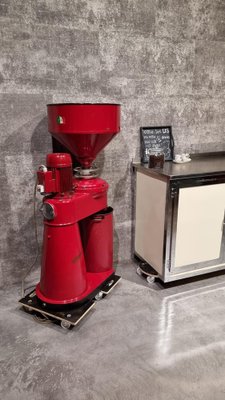Industrial Coffee Grinder vs. Domestic Grinder: Main Differences Detailed
Industrial Coffee Grinder vs. Domestic Grinder: Main Differences Detailed
Blog Article
Industrial Coffee Grinder Guide: Boost Efficiency and Quality
In the competitive landscape of coffee manufacturing, choosing the appropriate commercial coffee mill plays a pivotal duty in improving both efficiency and item quality. Understanding the nuances of various grinder kinds and key functions-- such as adjustable work setups and robust building and construction-- can dramatically influence the final taste account of the coffee.
Understanding Mill Types
When choosing a commercial coffee grinder, recognizing the numerous kinds readily available is important for maximizing both flavor removal and operational efficiency. Both main sorts of grinders are blade mills and burr mills. Blade grinders make use of sharp blades that chop coffee beans right into irregular dimensions, resulting in unequal extraction and potentially unfavorable flavors. While blade mills are usually extra budget friendly and appropriate for small-scale procedures, they are generally not advised for industrial use.

Eventually, choosing the ideal kind of mill is indispensable to maintaining quality and efficiency in coffee manufacturing, making it crucial for organizations to buy premium burr grinders for ideal results.
Key Attributes to Take Into Consideration
Selecting an industrial coffee mill calls for cautious factor to consider of a number of vital attributes that can significantly affect both efficiency and the total coffee experience. One of the key aspects to evaluate is the grinding mechanism. Burr mills are generally chosen over blade mills, as they provide a consistent grind dimension, which is critical for optimum extraction and taste.
An additional important function is the mill's capacity. Depending on the volume of coffee you require to process, pick a version that can manage your requirements without giving up rate or high quality. In addition, take into consideration the grind settings offered. A functional grinder with several settings permits you to customize the grind dimension to different developing techniques, improving the coffee's taste account.
The construction product also plays a duty in durability and maintenance. Stainless-steel parts often offer long life and are less complicated to clean, which is necessary for maintaining hygiene standards. Finally, review the grinder's noise degree, especially in a hectic café or manufacturing setting, where excessive sound can be turbulent. Purchasing a mill that stabilizes these functions can substantially improve both functional performance and the quality of the coffee offered.
Optimizing Grinding Refine
To accomplish the best cause coffee preparation, optimizing the grinding procedure is important. The grind size considerably affects removal, taste, and overall quality of the made coffee. Different brewing methods need particular work dimensions; for circumstances, coffee demands a fine work, while French press requires a rugged structure. Comprehending the connection in between work dimension and brewing technique is the initial step in optimization.


Furthermore, monitoring the grinding speed can optimize the process. Slower grinding often generates less warm, maintaining delicate tastes and fragrances. Alternatively, faster grinding might create too much heat, negatively influencing the coffee's top quality.
Upkeep and Treatment Tips
Proper upkeep and treatment of industrial coffee grinders are vital for guaranteeing optimal efficiency and longevity. Normal cleaning is the structure of maintenance; residue build-up can influence taste and grinding effectiveness. It is recommended to clean up the mill after each usage, wiping down the exterior and removing any type of coffee grounds from the burrs.
Furthermore, evaluate the grinding burrs for deterioration. Boring burrs can compromise grind consistency, so they need to be replaced as essential. Industrial Coffee Grinder. Periodically calibrating the mill is also important, as this keeps the wanted work size for various brewing methods
Lubrication of moving components need to be carried out according to the maker's specifications, as this lowers friction and extends the life of the devices. It is vital to make use of food-grade lubricants to guarantee safety and security and conformity with wellness policies.
Finally, keep the mill in a Continued completely dry and stable atmosphere to avoid corrosion and corrosion. By adhering to these upkeep and treatment pointers, operators can improve the effectiveness of their commercial coffee grinders while ensuring high-grade result and expanded functional life.
Return on Financial Investment Evaluation
Examining the roi (ROI) for commercial coffee mills is crucial for services looking for to maximize their coffee manufacturing capacities. A thorough ROI analysis helps figure out the financial feasibility of investing in high-grade mills, allowing organizations to evaluate the preliminary prices against prospective gains.
Analyze the acquisition rate of the grinder, including installation and any needed alterations to existing framework. High-performance mills frequently lead to decreased grinding time and raised throughput, which can significantly enhance productivity.
Furthermore, think about the effect on product quality. Industrial Coffee Grinder. Superior mills generate a more regular work dimension, which can enhance flavor accounts and client complete satisfaction, eventually driving sales. By increasing the top quality of the final product, organizations can validate higher pricing, leading to boosted income
Verdict
In summary, a commercial coffee grinder plays a crucial role in improving both performance and product quality within coffee production. Ultimately, the strategic investment in a reputable grinder adds considerably to boosted profits and competition in the coffee industry.
In the competitive landscape of coffee production, picking the right industrial coffee mill plays an essential function in enhancing both effectiveness and item quality. The 2 primary types of mills are blade mills and burr mills. Within the burr grinder category, there are level burr mills and visit the site conelike burr grinders, each with its benefits. Burr mills are typically chosen over blade mills, as they offer a regular grind size, which is crucial for ideal removal and flavor.
In recap, a commercial coffee grinder plays a crucial function in improving image source both efficiency and product high quality within coffee manufacturing.
Report this page